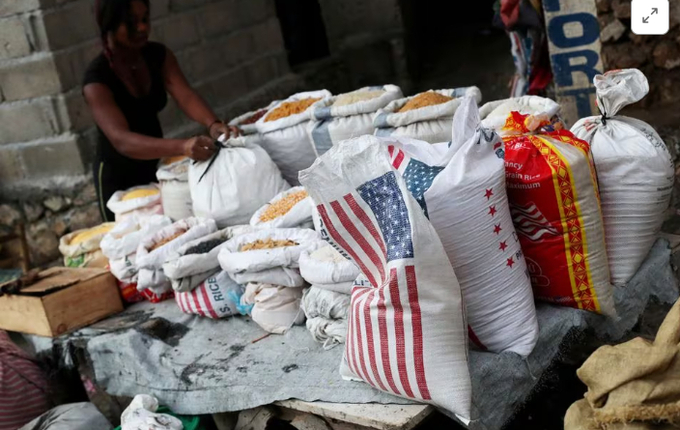May 17, 2025 | 21:09 GMT +7
May 17, 2025 | 21:09 GMT +7
Hotline: 0913.378.918
May 17, 2025 | 21:09 GMT +7
Hotline: 0913.378.918

A local sells rice and grains at a street market in Port-au-Prince, Haiti, February 19, 2019.
U.S. rice exports to Haiti, which account for the bulk of supplies of the country's key food staple, contain unhealthy levels of arsenic and cadmium, heavy metals that can increase risks of cancer and heart disease, according to a recent study by the University of Michigan.
Haiti is among the United States' top buyers of rice, alongside Mexico and Japan, and cheap imports are more affordable than local options in the Caribbean nation, the poorest state in the Western Hemisphere.
According to the study, average arsenic and cadmium concentrations were nearly twice as high in imported rice compared to Haitian-grown product, with some imported samples exceeding international limits.
Nearly all imported rice samples exceeded the U.S. Food and Drug Administration's recommendation for children's consumption. The study did not evaluate levels of toxins in other importing countries.
The U.S. FDA and State Department did not immediately respond to a request for comment.
The study, which attributed the dominance of imported rice to lower import tariffs and long-term contracts signed during political turmoil in the late 1980s and 1990s, said Haiti imports nearly 90% of its rice, almost exclusively from the U.S.
Former U.S. President Bill Clinton, who helped push subsidies of U.S. rice to Haiti, later called the move a "mistake" saying it had battered local production capacity.
The study also pointed to comparatively loose U.S. limits on concentrations arsenic and cadmium, which can leach from both human and naturally occurring sources to contaminate food and water. Rice is especially prone to absorb these metals.
The report cited Louisiana, Texas and Arkansas as top exporting states.
When researchers ran the study in 2020, they found that Haitians on average consumed 85 kg (187 lb) of rice per year, compared to 12 kg in the U.S., putting especially young Haitians at far greater risk of developing related health complications.
"The flooding of U.S. rice into Haiti is not only economically violent for Haitian peyizan who struggle to sell their local product, but also violent toward the long-term health of Haitian consumers," the report said.
"By maintaining a system dependent almost exclusively on U.S. rice, Haiti is importing a substantial amount of risk."
The report called for an ethical investigation into U.S. rice exporters, measures to strengthen Haiti's agricultural sector and flagged a "dire need" to boost the country's food safety regulations.
A violent conflict between heavily armed gangs has been spreading to Haitian farmlands, further pushing up food prices. The United Nations estimates over 300,000 have fled their homes and that some 40% of the population is going hungry.
(Reuters)

(VAN) Fourth most important food crop in peril as Latin America and Caribbean suffer from slow-onset climate disaster.

(VAN) Shifting market dynamics and the noise around new legislation has propelled Trouw Nutrition’s research around early life nutrition in poultry. Today, it continues to be a key area of research.

(VAN) India is concerned about its food security and the livelihoods of its farmers if more US food imports are allowed.

(VAN) FAO's Director-General emphasises the need to work together to transform agrifood systems.

(VAN) Europe is facing its worst outbreak of foot-and-mouth since the start of the century.

(VAN) The central authorities, in early April, released a 10-year plan for rural vitalization.

(VAN) Viterra marked a significant milestone in its carbon measurement program in Argentina, called Ígaris, reaching 1 million soybean hectares measured.